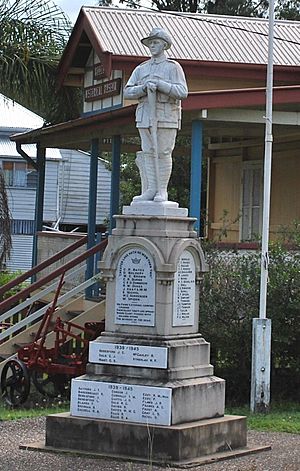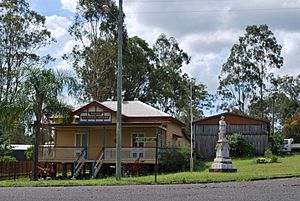Brooweena War Memorial facts for kids
The Brooweena War Memorial is a special monument in Brooweena, Queensland, Australia. It was built in 1922 to remember the brave local men and women who served in the First World War and Second World War. This memorial is listed on the Queensland Heritage Register, which means it's an important historical site. It stands in Smith Crescent and was made by F W Webb.
Quick facts for kids Brooweena War Memorial |
|
|---|---|

Brooweena War Memorial, 2008
|
|
| Location | Smith Crescent, Brooweena, Fraser Coast Region, Queensland, Australia |
| Design period | 1919 - 1930s (interwar period) |
| Built | 1922 |
| Official name: Brooweena War Memorial | |
| Type | state heritage (built) |
| Designated | 21 October 1992 |
| Reference no. | 600969 |
| Significant period | 1922- (social, fabric) 1922 (historical) |
| Significant components | memorial - soldier statue, commemorative plaque |
| Builders | F W Webb |
| Lua error in Module:Location_map at line 420: attempt to index field 'wikibase' (a nil value). | |
Contents
Remembering Our Heroes
The Brooweena War Memorial was put up in late 1922 by the people of the Woocoo Shire. It was made by F W Webb, a company from Maryborough. This special monument honours 39 local men who fought in the First World War. Sadly, 10 of them died. Later, more plaques were added for 43 local men and women who served in the Second World War.
The people of Brooweena showed amazing support during the First World War. They even helped pay for an ambulance to be sent to France. There is also another memorial, a bridge, south of the town. The memorial statue is quite large, especially for a small town like Brooweena.
Why War Memorials Are Important
Before the First World War, Australia didn't have many public monuments. But after the war, memorials became very important. They showed how much the war affected our young country. Australia lost about 60,000 people out of a population of 4 million. This was a huge impact on the nation.
Even before the war ended, people started building memorials. They were a way to show sadness and respect. These memorials were like sacred graves for soldiers whose bodies were buried overseas. The word "cenotaph" means "empty tomb." It was used because the soldiers were buried far from home.
Australian war memorials are special because they don't just remember those who died. They also honour everyone who served from a local area. This is because Australia's army was made up of volunteers. People were proud of all who served, whether they died or not. These memorials show how much communities were involved in the war.
The "Digger" Statue
In Queensland, the most popular type of war memorial was a statue of a soldier, often called a "digger." This was different from southern states, where tall, pointed monuments called obelisks were more common. The digger statue showed the ANZAC Spirit. It represented qualities like loyalty, courage, youth, and strength.
Most digger statues were made by local stonemasons. The Brooweena memorial's base is quite unique. Its design and the words carved on it are not like other memorials in Queensland.
The monument first stood in front of St Mary's Church of England. This was about three miles from Brooweena, near Teebar. It was officially revealed on January 6, 1923. Later, in 1992, it was moved to its current spot. This was done to protect it from damage.
What the Memorial Looks Like
The First World War Memorial is located at The Woocoo Historical Museum. It has a unique base, called a pedestal, with a digger statue on top.
The memorial is made of sandstone and sits on a concrete base. There are three smooth sandstone steps. Two of these steps are the same size, with a thinner step between them. On the front of the two larger steps, you can see marble plaques. These plaques have the names of the men and women who served in the Second World War.
Above these steps, there is a square pedestal. Marble plates are on the sides and front of this pedestal. They have a special poem, the names of the 10 local men who died, and the 39 others who served in the First World War. The digger statue stands on top of the pedestal.
The digger statue stands tall. His head is up, and his hands rest on a rifle. The rifle points downwards and rests on his right boot. There is a tree stump behind the statue for support.
Why It's a Heritage Site
The Brooweena War Memorial was added to the Queensland Heritage Register on October 21, 1992. This means it's officially recognized as an important historical place.
- Shows Queensland's History: War memorials like this one show how Queensland's history unfolded. They represent a time when many communities across the state were very patriotic.
- Unique Design: This memorial is special because of its unusual pedestal design and the words carved on it. It's also a noticeable landmark in the town.
- Shows How Memorials Were Made: The monument helps us understand what commemorative structures were like after the First World War. It uses suitable materials and design. As a digger statue, it's a great example of the most popular type of memorial in Queensland.
- Beautiful and Important: The memorial is important for its beauty. It stands out in the town and has a unique design.
- Strong Community Connection: It has a strong link to the community. It shows how much a big historical event affected the people. This memorial also highlights the amazing patriotism of the people of Brooweena.
 | Bessie Coleman |
 | Spann Watson |
 | Jill E. Brown |
 | Sherman W. White |


